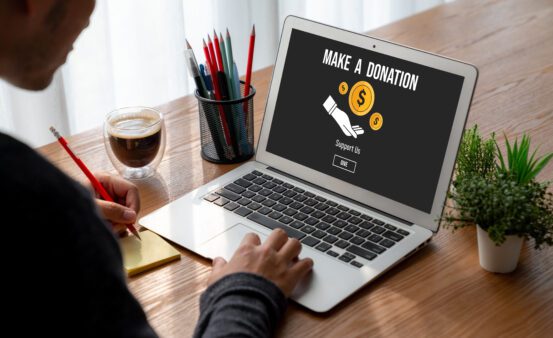Protect Yourself from Charitable-Giving Scams

It’s that time of year. Everywhere you go, charitable organizations will be seeking donations to help those in need. Those solicitations work. Last year, Americans gave just over $500 billion to charity, according to the Lilly Family School of Philanthropy. And nearly 20% of those donations ($100 billion) were given in December, says USA Today. While a majority of charities are legitimate, criminals will always find ways to swindle and steal. Especially at the expense of someone’s holiday goodwill. Here’s how to spot a fraudulent charity and how to avoid losing your private and financial information in the process.
Fraudulent Charitable Giving Explained
Whether you’re online, answering the phone, or out shopping, you could come into contact with a faux charity or fundraising entity. These can include fake organizations raising money for U.S. veterans, disaster relief, children’s charities and more.
According to AARP, these fake charities often succeed by mimicking the real thing. Their signage, website, email, or other marketing materials are designed to put you at ease and part you from your money. In other cases, they make up a charity name and use sophisticated design techniques to trick you into giving.
These scams can come into your world via email, postal mail, crowdfunding platforms, fake social media accounts, websites, text messages, and phone calls.
Giving More Than Money
When you donate to a fraudulent charity, you’re giving them more than your money. You’re also sharing your personal information. If you use a credit card or checking account number, you’ve just given them your financial information as well.
Thankfully, there are ways to spot a false charity and avoid becoming a statistic.
Fraudulent Charity Warning Signs
Before you click the “Give Now” button, consider these warning signs.
- Do they want payment in cash, gift cards, or wire transfers? If so, they are fraudulent.
- Do they demand a donation today? Legitimate charities will never pressure you.
- Are they making repeated calls or sending more than one email/text? A real charity will not pressure for donations, nor will they barrage you with multiple requests. They don’t want to alienate you.
Confirmation Before Contribution
To avoid giving to a fake charity, do your homework. That includes the following:
- Verify phone numbers. If someone says they are from a specific charity, go online and look for that charity’s phone number. Then call to confirm.
- Avoid opening suspicious emails. And never click links in suspect emails. These can be phishing attacks or an attempt to spread malware. This can include an email thanking you for a donation you never gave. When you click the link in the email or text, it’ll take you to a fake website where they’ll steal your personal and financial information.
- Authenticate social media posts. Was the post made by the official charitable organization? To verify, simply go to the organization’s social media home page and look for the specific post. If you don’t see it there, it’s likely fraudulent.
- Take notes. If someone calls asking for a donation, ask them for a callback number. Then verify that number on your own. If they don’t match up, it’s a scam.
- Check the email or web address. Avoid giving to any charity that uses a free email service, such as Google or Hotmail. And double-check the website URL for typos.
To verify a nonprofit organization, check with the Montana Nonprofit Association. The U.S. Department of Veterans Affairs has created an online tool that allows you to search for legitimate veteran fundraisers. Additionally, the Better Business Bureau, along with Charity Navigator, Charity Watch, and GuideStar can help you identify legitimate causes. If these organizations don’t have a record of the charity or non-profit asking you for money, don’t make a donation. Instead, donate directly to the charitable organization of your choice.
Clearwater Credit Union is Here to Help
If you’ve accidentally given money along with your personal and financial information to a fraudulent charity, give us a call or stop by your local branch. We’ll do what we can to help, including canceling and re-issuing credit cards, changing your login information, and helping you review your credit report. Also, contact the FBI’s Internet Crime Complaint Center (IC3) along with the Montana Department of Labor and Industry fraud and identity theft division.


